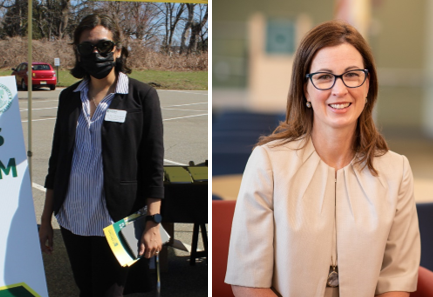Felician Conducts Study Entitled The COVID-19 Diaries: Identity, Teaching, and Learning at a Crossroads
At the Crossroads: Felician Conducts Study Titled ‘The COVID-19 Diaries: Identity, Teaching, and Learning!
Two distinguished Felician faculty members have recently had their research published in the professional journal, “Education Frontiers.” The COVID-19 Diaries: Identity, Teaching, and Learning at a Crossroads is the work of Dr. Charity Dacey, Associate Dean of Felician’s School of Education and Assistant Professor of Teacher Education, and Dr. Lavina Sequeira, Director of the University’s Honors Program and Assistant Professor of Philosophy. It appeared in the December 16, 2020 edition of the periodical.
The project was conceived in 2019, when the two educators met on Felician’s campus and realized they had much in common, including their dissertation committee, mentors, and a strong desire to improve pedagogical practices to better serve the student community. “I have always had the sense that I wanted to help my students become better learners,” said Dr. Sequeira, “and the way I could do that is by becoming a better teacher myself.” Dr. Dacey felt similarly. The pair ultimately outlined a small project, intending to look at their own pedagogical practices to examine how best to help the student population and become better educators themselves.

Dr. Dacey and Dr. Sequeira applied and received the necessary approval from the Institutional Review Board to begin the project. Then the COVID-19 pandemic hit. Classes shifted from in person to online, and the two educators began to see changes in their students. A gap became apparent between those students who were becoming disconnected and those that remained engaged. The researchers wanted to find out how they could help students overcome challenges to their learning by looking at factors influencing them beyond the main issue of the COVID-19 pandemic.
Their research proposal included a student questionnaire asking about individual experiences related to the student’s perceptions of intersectionality, and how identities come to be and emerge in experiences. It was in effect, a self-study of learning with their students about their own teaching practices. The educators observed each other teach and interact with students many times. “We would meet and debrief and provide positive feedback to one another. It opened up a lot of observations that maybe we didn’t notice ourselves,” said Dr. Dacey. “We gave each other suggestions and asked probing questions that made us think about what we could do differently to bring this awareness of their identities, and how that factors into their learning.”
Both researchers wrote the work to be accessible to peers and colleagues. Dr. Sequeira explains, “We didn’t want to make it, for lack of a better term, too academic. It is academic, but it is accessible in the sense that everybody can read it and understand it. So, we specifically wrote from that lens.”
Dr. Dacey says at the heart of the research is the opportunity to work towards social justice. “Research is only valuable if you use it for good. We have proposed that we take a harder look at the Felician culture and address the need for our students to be more aware of social justice issues. We are now looking at creating three courses around this topic.”
Dr. Sequeira says it’s a beautiful thing knowing the research is coming to life at Felician University. “We are all in this together, and that has been influenced through our small research project, and to see it come to fruition in our community is just wonderful.”
